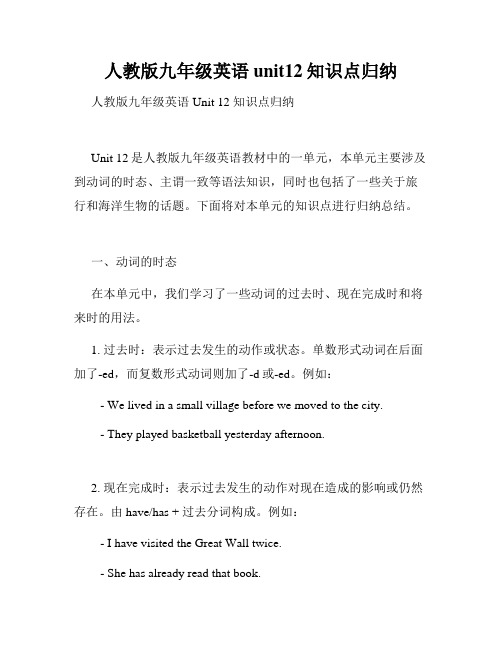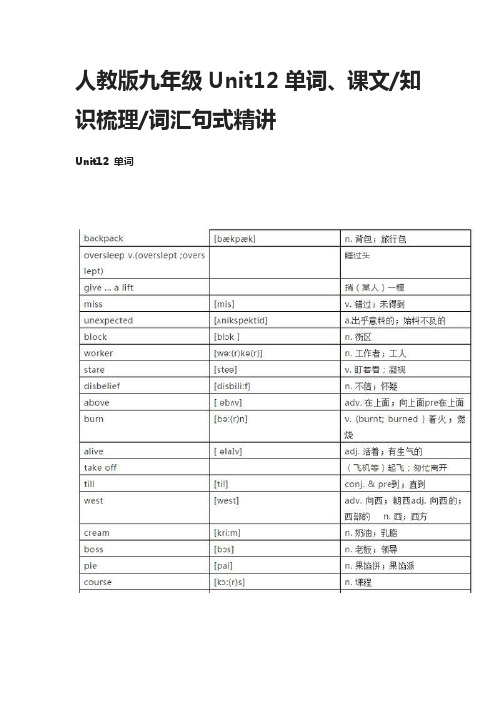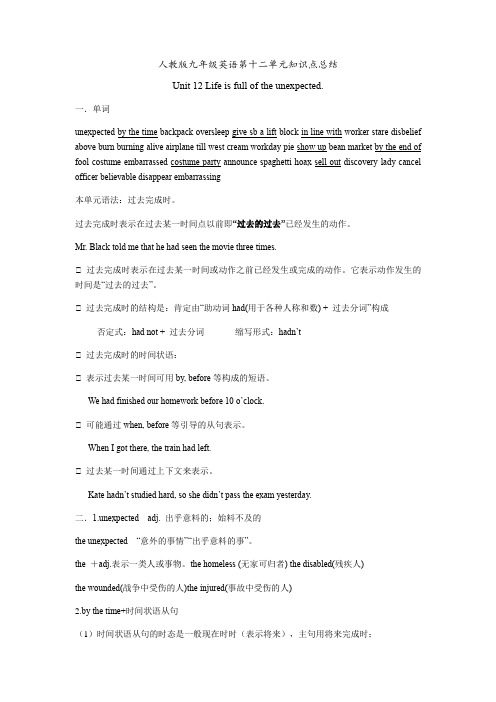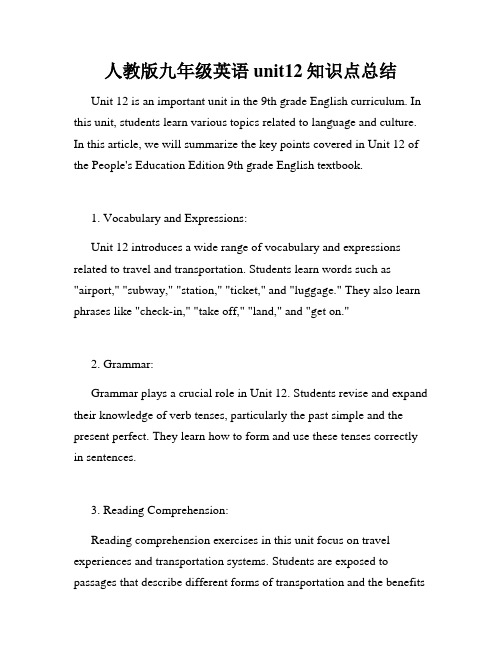人教版新目标英语九年级-Unit12单元知识点小结
人教版九年级英语unit12知识点归纳

人教版九年级英语unit12知识点归纳人教版九年级英语Unit 12 知识点归纳Unit 12是人教版九年级英语教材中的一单元,本单元主要涉及到动词的时态、主谓一致等语法知识,同时也包括了一些关于旅行和海洋生物的话题。
下面将对本单元的知识点进行归纳总结。
一、动词的时态在本单元中,我们学习了一些动词的过去时、现在完成时和将来时的用法。
1. 过去时:表示过去发生的动作或状态。
单数形式动词在后面加了-ed,而复数形式动词则加了-d或-ed。
例如:- We lived in a small village before we moved to the city.- They played basketball yesterday afternoon.2. 现在完成时:表示过去发生的动作对现在造成的影响或仍然存在。
由have/has + 过去分词构成。
例如:- I have visited the Great Wall twice.- She has already read that book.3. 将来时:表示将来要发生的动作或存在的状态。
由will + 动词原形构成。
例如:- We will go to the beach tomorrow.- They will have a party next week.二、主谓一致主谓一致是指主语和谓语在人称和数上保持一致。
在本单元中,我们需要特别注意以下几点:1. 主语为第三人称单数时,谓语动词需要加-s或-es。
例如:- He often goes to the cinema on weekends.2. 表示时间、距离、金钱等的量词作主语时,谓语动词的单复数形式与它们代表的数量有关。
例如:- Ten yuan is enough to buy a drink.三、旅行话题在本单元中,我们学习了一些与旅行相关的词汇和句型,并通过对话的形式来进行实际应用。
人教版九年级英语Unit12单词、课文,知识梳理,词汇句式精讲

人教版九年级Unit12单词、课文/知识梳理/词汇句式精讲Unit12 单词Unit12 知识梳理【重点短语】1. take a shower洗浴2. leave my backpack at home 把背包忘在家里3. get back to school 返回学校4. start teaching 开始教学5. go off 响铃6. rush out the door 冲出房门7. give sb a lift 捎某人一程8. miss both events 错过两个事件9. full of unexpected 充满着不可预知性10. be about to do sth 正要做某事11. stare in disbelief at 难以置信地盯着。
12. raise above the burning building 从正在燃烧的楼上升起13. jump out of bed 跳下床14. collect the math homework 收数学作业15. complete the work for my boss 完成老板的工作16. make the apple pie 制作苹果馅饼17. show up 赶到,出现18. add the green beans 加绿豆荚【重点句型】1.By the time I got up, my brother had already gotten in the shower. 当我起床时,我哥哥已经进了浴室了。
2.By the time I got outside, the bus had already gone.当我出来时,公汽已经走了。
3.When I got to school, I realized I had left my backpack at home.当我到达学校时,我才意识到我把背包忘在家里了。
4.By the time I walked into class, the teacher had started teaching already.当我走进教室时,老师已经开始讲课了。
人教版九年级英语第十二单元知识点总结

人教版九年级英语第十二单元知识点总结Unit 12 Life is full of the unexpected.一.单词unexpected by the time backpack oversleep give sb a lift block in line with worker stare disbelief above burn burning alive airplane till west cream workday pie show up bean market by the end of fool costume embarrassed costume party announce spaghetti hoax sell out discovery lady cancel officer believable disappear embarrassing本单元语法:过去完成时。
过去完成时表示在过去某一时间点以前即“过去的过去”已经发生的动作。
Mr. Black told me that he had seen the movie three times.⑴ 过去完成时表示在过去某一时间或动作之前已经发生或完成的动作。
它表示动作发生的时间是“过去的过去”。
⑴ 过去完成时的结构是:肯定由“助动词had(用于各种人称和数) + 过去分词”构成否定式:had not + 过去分词缩写形式:hadn’t⑴ 过去完成时的时间状语:⑴ 表示过去某一时间可用by, before等构成的短语。
We had finished our homework before 10 o’clock.⑴ 可能通过when, before等引导的从句表示。
When I got there, the train had left.⑴ 过去某一时间通过上下文来表示。
Kate hadn’t studied hard, so she didn’t pass the exam yesterday.二.1.unexpected adj. 出乎意料的;始料不及的the unexpected “意外的事情”“出乎意料的事”。
九年级英语人教版新课标Unit12. Life is full of the unexpected知识点详解..

Unit12. Life is full of the unexpected课文知识点详解Section A.1.Life is full of the unexpected. 生活充满了意外。
(标题)【解析1】be full of = be filled with充满,装满【解析2】unexpected adj. 出乎意料的;始料不及的the unexpected “意外的事情”“出乎意料的事”。
the +adj.表示一类人或事物。
英语中,有些形容词与定冠词the连用,表示一类人或事物,在句子中起名词的作用。
the homeless (无家可归者) the disabled(残疾人)2. By the time I got outside, the bus had already left. 当我出来时,公共汽车已经离开了。
(1b)【解析】by the time 在……以前,指从过去的某一点到从句所示的时间为止,常引导表示过去的时间状语从句,主句常用过去完成时,即had+动词过去分词。
By the time I got up, he had already left. 当我起床时,他已经离开了。
【拓展】by now 表示“到现在为止”,通常与现在完成时连用。
By now I have collected 200 dolls. 到现在为止,我已收集了二百个布娃娃。
3. When I got to school, I realized I had left my backpack at home.(1b)当我到学校时我意识到我把书包忘在家里了。
【解析】leave sth. +地点“把某物忘在某处”forget意为“遗忘某物”,指忘记一件具体的东西,但不能有具体的地点。
I left my book on the desk. 我把书忘在了桌子上。
I forgot my umbrella yesterday .我昨天忘了带伞。
人教版九年级英语unit12知识点总结

人教版九年级英语unit12知识点总结Unit 12 is an important unit in the 9th grade English curriculum. In this unit, students learn various topics related to language and culture. In this article, we will summarize the key points covered in Unit 12 of the People's Education Edition 9th grade English textbook.1. Vocabulary and Expressions:Unit 12 introduces a wide range of vocabulary and expressions related to travel and transportation. Students learn words such as "airport," "subway," "station," "ticket," and "luggage." They also learn phrases like "check-in," "take off," "land," and "get on."2. Grammar:Grammar plays a crucial role in Unit 12. Students revise and expand their knowledge of verb tenses, particularly the past simple and the present perfect. They learn how to form and use these tenses correctly in sentences.3. Reading Comprehension:Reading comprehension exercises in this unit focus on travel experiences and transportation systems. Students are exposed to passages that describe different forms of transportation and the benefitsand challenges of traveling. They practice answering comprehension questions based on the texts.4. Listening Skills:Unit 12 enhances students' listening skills through various audio materials. They listen to dialogues and conversations related to travel arrangements, booking tickets, and navigating through different transportation systems. Listening exercises improve students' ability to understand spoken English in real-life situations.5. Speaking and Conversation:Unit 12 encourages students to participate in speaking activities and conversations related to travel. Students practice asking and answering questions about their travel experiences, describing places they have visited, and talking about transportation modes they prefer. These activities build their confidence in using English to communicate effectively with others.6. Writing Skills:In Unit 12, students improve their writing skills by composing travelogues and diary entries. They learn how to describe their trips, highlight memorable experiences, and provide recommendations forfuture travelers. Through writing exercises, students develop their creativity and express their thoughts in a coherent manner.7. Cultural Awareness:Unit 12 also incorporates cultural elements to broaden students' understanding of different customs and traditions around the world. Students learn about famous tourist destinations, historical landmarks, and cultural practices in different countries. This helps foster cultural awareness and an appreciation for diversity.8. Practical Application:Unit 12 emphasizes the practical application of English language skills in real-life situations. Students are given opportunities to role-play and simulate scenarios such as booking a hotel, purchasing tickets, and giving directions. This allows them to apply their language skills in meaningful ways.In conclusion, Unit 12 of the People's Education Edition 9th grade English textbook covers various aspects of language and culture related to travel and transportation. Students engage with vocabulary, grammar, reading, listening, speaking, and writing activities. Through these exercises, students not only improve their English language proficiencybut also gain a deeper understanding of different cultures and develop practical skills necessary for traveling.。
(完整版)九年级英语人教版新课标Unit12.Lifeisfulloftheunexpected知识点详解..

Unit12. Life is full of the unexpected课文知识点详解Section A.1.Life is full of the unexpected. 生活充满了意外。
(标题)【解析1】be full of = be filled with充满,装满【解析2】unexpected adj. 出乎意料的;始料不及的the unexpected “意外的事情”“出乎意料的事”。
the +adj.表示一类人或事物。
英语中,有些形容词与定冠词the连用,表示一类人或事物,在句子中起名词的作用。
the homeless (无家可归者) the disabled(残疾人)2. By the time I got outside, the bus had already left. 当我出来时,公共汽车已经离开了。
(1b)【解析】by the time 在……以前,指从过去的某一点到从句所示的时间为止,常引导表示过去的时间状语从句,主句常用过去完成时,即had+动词过去分词。
By the time I got up, he had already left. 当我起床时,他已经离开了。
【拓展】by now 表示“到现在为止”,通常与现在完成时连用。
By now I have collected 200 dolls. 到现在为止,我已收集了二百个布娃娃。
3. When I got to school, I realized I had left my backpack at home.(1b)当我到学校时我意识到我把书包忘在家里了。
【解析】leave sth. +地点“把某物忘在某处”forget意为“遗忘某物”,指忘记一件具体的东西,但不能有具体的地点。
I left my book on the desk. 我把书忘在了桌子上。
I forgot my umbrella yesterday .我昨天忘了带伞。
人教版九年级英语第十二单元知识点总结
人教版九年级英语第十二单元知识点总结Unit 12: Life is Full of the UnexpectedIn this unit。
we XXX。
"unexpected" means something that is surprising or not expected。
We also learned about the phrase "the unexpected," XXX.In terms of grammar。
we focused on the past perfect tense。
This tense is used to describe an n that had already happened before another past n or time。
The structure of the past perfect tense is "had + past participle," and it can be used in both positive and negative XXX.To indicate the time frame of the past perfect tense。
we can use time ns like "by," "before," "when," or XXX。
For example。
"We had finished our homework before 10 o'clock," or "When I got there。
the train had already left."Overall。
this unit helped us better XXX.XXX XXX to those who have been injured in war。
人教版九年级全一册英语Unit12单元语法知识点总结
人教版九年级全一册英语Unit12单元语法知识点总结本单元重点短语的具体用法1. take a shower:“take a shower”的意思是洗澡或淋浴。
例如:I need to take a shower before going to bed.(我需要在睡觉前洗个澡。
)2. leave my backpack at home:“leave sth at home”表示把某物忘在家里。
例如:I left my keys at home and had to go back.(我把钥匙忘在家里了,不得不回去拿。
)3. get back to school:“get back”的意思是返回,“get back to school”就是回到学校。
例如:I need to get back to school to hand in my homework.(我需要回到学校交作业。
)4. start teaching:“start doing sth”表示开始做某事,“start teaching”就是开始教学。
例如:The teacher started teaching and the students began to take notes.(老师开始教学,学生们开始做笔记。
)5. go off:“go off”可以表示(闹钟等)响铃。
例如:The alarm went off and woke me up.(闹钟响了,把我叫醒了。
)6. rush out the door:“rush out”的意思是冲出去,“rush out the door”就是冲出房门。
例如:I rushed out the door without breakfast this morning.(今天早上我没吃早饭就冲出房门了。
)7. give sb a lift:“give sb a lift”的意思是让某人搭车、捎某人一程。
人教版九年级英语Unit12知识点总结
Unit 12 Life is full of the unexpected.重点单词:Unexpected, backpack, oversleep, ring, block, woker, stare, above, burn, alive, airport, till, west, cream, pie, bean, market, fool, discovery, lady, cancel, officer, believable, disappear.重点短语:by the time 在……之前get up 起床be full of 充满give…a lift 捎(某人)一程go off 响铃rush out 冲出wake up 醒来at least 至少;反正be about to 将要go on 发生;向前走stare at 盯着……看in disbelief 怀疑地in line with (与……)成一排turn into 变成take off 起飞jump out of 从……跳下show up 赶到by the end of 在(某时间点)以前get dressed 穿衣服stay up 熬夜April Fool’s Day 愚人节Costume party 化妆舞会Sell out 卖光Take place 发生Play jokes on sb. 和某人开玩笑End up 以……结束Get married to 和……结婚Police officer 警官Run out of 用完a piece of 一张重点句式;Life is full of the unexpected.生活充满了意料之外的事。
When I got to school,I realized I had left my backpack at home.当我到达学校的时候,我意识到我把背包忘在家里了。
新目标英语九年级Unit12知识要点归纳
美知【重点词组或短语】【重难点句子】1.go off 响铃2.give sb.a lift 捎某人一程3.be about to do sth.正要做某事4.stare in disbelief at 难以置信地盯着5.raise above the burning building 从正在燃烧的楼上升起6.jump out of bed 跳下床7.collect the math homework 收数学作业plete the work for my boss 完成老板的工作9.show up 赶到,出现10.get stressed out 紧张起来11.hand in homework 交作业12.take place 发生13.play all kinds of tricks and jokes 开各种玩笑14.sell out 卖完,售完15.lose weight 减肥16.by the end of that day 到那天结束时17.end up with 以……结束18.get married 结婚19.have a happy ending 有一个幸福的结局20.fear spread across the whole country 恐惧席卷整个国家21.head west 向西前进22.in the middle of the road 在路中间23.turn around 调头、转身24.make an unexpected discovery 有一个出人乎意料的发现25.cancel the plan 取消计划26.lead to 通向27.miss doing sth.错过做某事28.show up 赶到;露面1.I was about to go up when I decided to get a coffee first.我正准备上去,这时决定先喝一杯咖啡。
2.As I was waiting in line with other office workers,I heard a loud sound.正当我和其他办公室员工在排队等候时,我听到了一声巨响。
- 1、下载文档前请自行甄别文档内容的完整性,平台不提供额外的编辑、内容补充、找答案等附加服务。
- 2、"仅部分预览"的文档,不可在线预览部分如存在完整性等问题,可反馈申请退款(可完整预览的文档不适用该条件!)。
- 3、如文档侵犯您的权益,请联系客服反馈,我们会尽快为您处理(人工客服工作时间:9:00-18:30)。
Unit12. Life is full of the unexpected重点短语句子重难点解析 1. Life is full of the unexpected. 生活充满了意外。
be full of (= be filled with ) 充满,装满①Our life____________________(充满)chances, but there are also a lot of challenges. ②The box ____________________(装满)books. ③On hearing the news, her heart was _____ gratitude (感激). A. filled of B. full with C. filledwith D. fill with 2. By the time I got outside, the bus had already left.当我到外面的时候,公共汽车已经离开了。
by the time 在……以前 (常引导表示过去的时间状语从句,主句常用过去完成时。
) By the time I got up, he had already left. 我起床时,他已经走了。
① I overslept this morning. By the time I got to the train station, the train ____________(leave ). ②By the time of last term, we ______ all the lessons. A. finished B. have finished C. had finished D. will finish ③____ the time I heard the noise, it had already gone. A. ByB. WhenC. At 【拓展】by now 表示“到现在为止”,通常与现在完成时连用。
By now I have collected 200 dolls.3. When I got to school, I realized I had left my backpack at home.当我到达学校时,我才意识到我把书包落在家里了。
leave sth. +地点 把某物落在某处①By the time I locked the door, I realized I _____ my keys at home.A. had repairedB. had changedC. had forgottenD. had left②I'm sorry. I ____ my English homework at home. -Don't forget ____ it to school tomorrow.A. left, to bringB. forgot, to takeC. lost, to bring4. My alarm clock didn't go off! 我的闹钟没有响!go off 发出响声I was late today because my alarm clock didn't ____. A. run offB. go offC. give outD. give up 5. Luckily, Carl's dad saw me on the street and gave me a lift in his car.幸运的是,卡尔的老爸在街上看到我,就捎了我一程。
give sb. a lift (=give sb. a ride / give a ride to sb. ) 捎某人一程①The poor old woman was standing in the middle of the road and asked someone to ____.A. give him a rideB. give her a rideC. enjoy a rideD. accept a ride②Tom drove by and gave me a ____ on the way home.A. flightB. RunC. walkD. lift6. I was about to go up when I decided to get a coffee first.当我正要上楼,这时我决定先去买杯咖啡。
be about to (do sth.) 将要;正打算;即将;就要1. by the time 在……之前2. be full of 充满3. give . . . a lift 捎(某人)一程4. go off 响铃5. rush out 冲出6. wake up 醒来 wake sb. up 叫醒某人7. at least 至少;反正8. be about to do sth. 将要做某事9. go on 发生;向前走 10. stare at 盯着……看 11. in disbelief 怀疑地12. in line with . . . (与……)成一排 13. turn into 变成 14. jump out of 从……跳下 15. show up 赶到;露面16. by the end of 在(某时间点)以前17. get dressed 穿衣服 18. stay up 熬夜19. April Fool's Day 愚人节 20. Costume party 化妆舞会21. sell out 卖光22. take place 发生23. play jokes on sb. 和某人开玩笑 24. play a trick on sb. 捉弄某人25. end up doing sth. 结果是(做)…;以(做)…而告终 end up with sth. 以某事结束 26. get married to 和……结婚27. police officer 警官28. run out of用光;耗完强调动作马上就要发生,不与具体的时间状语连用。
Hurry up, Tom! The train is _____ to start. A. aboutB. withC. forD. At7. I went to my favorite coffee place even though it was two blocks east from my office.我去了我最喜欢的咖啡店,虽然它在我办公室东边两个街区以外。
even though即使,虽然,尽管(用于引导让步状语从句)①I don't like vegetables ____ they are good for my health.A. becauseB. even thoughC. after allD. so that②____ Frank left school at 16, he still become a successful writer.A. Ever sinceB. In factC. After allD. Even though8. Last Friday night, my friend invited me to his birthday party.上周五晚上,我朋友邀请我参加他的生日聚会。
⑴invite sb. to do sth.邀请某人做某事①Let's call up Jim and invite ______to play football. A. he B. him C. his⑵invite sb. to +地点邀请某人去某地②He invited a lot of friends _______________(come)to his birthday party.③She was very pleased because we invited ______ to stay with us at ______ house.A. she; weB. her; ourC. her; oursD. hers; us④Claudia, are you going to Jeff 's birthday party on Saturday?-Unless I______ .A. will be invitedB. am invitedC. was invitingD. invited⑤Tom! I looked for you everywhere at the party last night. -Oh, I _______ to the party.A. am invitedB. was invitedC. am not invitedD. wasn't invited9. After an hour, the other kids showed up...一小时后,其他的孩子们都来了...show up赶到;露面;出席★常见带show的短语on show(= on display)展出;表演show off炫耀;卖弄)show sb. around带某人四处参观/看看show sb. sth.(=show sth. to sb.)给某人看某物①He didn't show _______ until the meeting was over.A. onB. outC. inD. up②-It's everyone's duty to join the Clean Your Plate Campaign.-Sure. We should try to _____ all the food that we've ordered.A. give upB. eat upC. turn upD. show up③I used to _______ with my wife and watch TV movies at home.A. show upB. wake upC. come upD. stay up④His works are _____________ in the library today. 他的作品今天在图书馆展出。
⑤ __________________________ is very boring. 正放映的那部电影非常枯燥。
